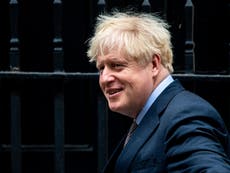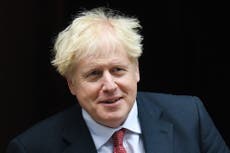Why Britain must not become a law unto itself over Brexit
The government – led by Boris Johnson – needs to rethink its approach and put the national interest above Brexit ideology

Your support helps us to tell the story
From reproductive rights to climate change to Big Tech, The Independent is on the ground when the story is developing. Whether it's investigating the financials of Elon Musk's pro-Trump PAC or producing our latest documentary, 'The A Word', which shines a light on the American women fighting for reproductive rights, we know how important it is to parse out the facts from the messaging.
At such a critical moment in US history, we need reporters on the ground. Your donation allows us to keep sending journalists to speak to both sides of the story.
The Independent is trusted by Americans across the entire political spectrum. And unlike many other quality news outlets, we choose not to lock Americans out of our reporting and analysis with paywalls. We believe quality journalism should be available to everyone, paid for by those who can afford it.
Your support makes all the difference.As we write this, the latest twist to the post-Brexit negotiations is playing out unpredictably.
The Internal Market Bill, as presented, has to make its way through both the Commons and Lords. But regardless of the outcome, the government’s decision to seek to act in this way is a very bad moment for the reputation of our country.
If the bill passes into law unchanged, it would represent an unprecedented, deliberate breach of a treaty obligation and of international law. What is even more astonishing, is the fact that these are not some old obligations, but ones entered into by this government only 11 months ago and approved by this current parliament.
The implications are serious. Other governments will not trust the UK to honour our obligations in the future. So our ability to agree trade deals will be greatly diminished.
Both the speaker of the US House of Representatives, Nancy Pelosi, and the chair of its Committee on Ways and Means, Richard Neal, have stated that no US-UK trade deal could pass Congress if the UK breaks an international treaty with an impact on the Good Friday Agreement.
Disregard for the rule of law and the value of international agreements has been a recently emerging pattern. Earlier this month, the Home Office tweeted a video that was universally condemned by the UK’s leading legal bodies for its use of the term “activist lawyers”. A more accurate statement would have simply been “lawyers doing their jobs”.
However, behind the headline-grabbing attack on lawyers, the statements in the video expose – at best – a lack of understanding of the existing frameworks concerning EU asylum governance, or – at worst – the start of a determined effort to undermine the UK’s position in the Council of Europe and as a signatory of the European Convention on Human Rights. It also overlooks the wider issues associated with refugees and migrants undertaking the perilous journey across the English Channel; which is a consequence of people trafficking and international organised crime. Continued security cooperation with the European Union will be vital to successfully tackle these issues.
Unsurprisingly for a government increasingly characterised by U-turns, a few hours after a Home Office spokesperson claimed the video would not be taken down, it was deleted – although not before it was viewed more than 1.6 million times.
Let’s begin with the claim that “currently [migrant] return regulations are rigid and open to abuse”. One can reasonably assume that this is a reference to the Dublin Convention, an EU-wide regulation which stipulates that the EU country an individual seeking asylum first enters, is responsible for accepting or rejecting the claim. It works in tandem with Eurodac – the EU fingerprint database for identifying asylum seekers.
While not perfect, the convention has long been supported by successive UK governments. In 2018 it allowed the UK to transfer 2,622 migrants back to EU countries. From 1 January 2021, we will no longer be a party to the Dublin Convention or the Eurodac database.
We will thus lose our ability to return migrants and create a legal vacuum. The UK will fall back on the 1951 Geneva Convention Relating to the Status of Refugees and the subsequent 1967 protocol, allowing refugees to legitimately make a claim for asylum in the UK after passing through EU countries – an interpretation supported by UK case law. It would not be unreasonable to expect such a situation to result in an increased number of migrants entering and be able to remain in the United Kingdom.
The video claimed “we will soon no longer be bound by EU laws and can negotiate our own return arrangements” – a sentiment echoed by the prime minister, Boris Johnson, during PMQs last week when he said “we will take advantage of leaving the EU by changing the Dublin regulations on returns”. The prime minister will be disappointed when he fails to turn his ambition into reality.
There is little prospect of the UK reaching a bilateral agreement with France, or any other EU country, to allow the return of refugees at present. Since asylum governance is highly harmonised in the EU under the Common European Asylum System, the ability to negotiate an agreement that is in any way different to the Dublin Convention is severely limited, if not entirely impossible.
Migrants crossing the Channel is not something which is happening in isolation. The root causes are associated with international organised crime of which people trafficking is but one manifestation – a fact that is too often overlooked. Without any agreements in place, something that looks increasingly likely, the UK will be disconnected from all EU networks, information systems and databases and will no longer participate in EU Agencies that bring us together to fight international organised crime. The UK simply cannot “go it alone” and tackle these issues. Such an approach will only exacerbate the problem.
In 2013, Theresa May, as home secretary, argued that “the UK should opt out of all EU police and criminal justice measures… and seek to rejoin measures where it is in the national interest to do so”. However, the following year when she presented a series of impact assessments to parliament, the conclusion reached was unequivocal: cooperation in security and police matters is vital to our national interest. Given the interconnectedness of EU-wide agencies, databases and instruments, the UK opted to stay in them. Perhaps this was an earlier indicator that cherry-picking simply does not work?
For example, the Second Generation Schengen Information System holds information on terrorists. The Prüm system allows EU states to grant reciprocal access to DNA analysis, fingerprints and vehicle registration data. The European Criminal Records Information System enables rapid information exchanges on convictions throughout the EU. Likewise, the UK can issue an EU-wide European arrest warrant (EAW) that requires another member state to arrest and transfer a criminal suspect back to the UK to stand trial.
Under an EAW the average time for extradition is just 48 days, whereas the Council of Europe 1957 European Convention on Extradition can take up to a year and in some cases much longer.
The UK stands to lose all the benefits of security and policing cooperation with the EU without visible advantages from doing so. The ability to cherry-pick agreements that are so materially different from pre-existing arrangements is unrealistic. The government needs to rethink and put the national interest above Brexit ideology.
We have good reasons in the UK to be proud of our record of offering a safe haven to those escaping conflict and persecution, be it European Jews in the 1930s, Ugandan Asians in 1972 or those forced more recently to escape tyrannical and murderous regimes.
To maintain this, as the government rightly states it wishes to do, whilst addressing immigration issues, can only be done through continued cooperation with our friends and allies in Europe and remaining part of the Dublin Convention. Another reason to use – and not to break – international law.
Dominic Grieve QC is a former attorney general and the former Conservative MP for Beaconsfield. He is a current vice president of the Conservative Group for Europe and chair of its justice and home affairs policy group
Sajjad Karim is the former MEP for North West England, former legal affairs spokesperson for Conservatives in the European parliament (2009 to 2019) and current member of the Conservative Group for Europe





